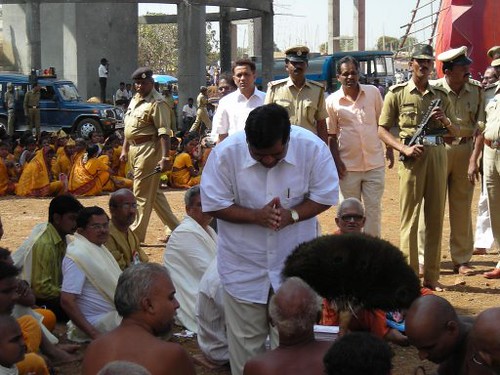The Jain concept of Pramod refers to honouring those superior to us.
Thinking of honoring superiors.
Think of having heartfelt affection, regard and esteem for people who are superior to us in virtues, knowledge and ability. Not to entertain such feelings as jealousy and envy; and not to look at anyone maliciously and with a sinister feeling. Think to be cheerful and happy at the sight of virtuous people; and to express cordial happiness on seeing such people.Pramod Bhavana (Thinking of Appreciation)
In this bhavana, we admire the success of our friends, spiritual leaders and Arihants. One of the
most destructive forces in our lives is jealousy. However, friendship combined by admiration,
leaves no place (destroys) jealousy. As jealousy subsides or is gone, negative impulses are turned into positive ones, and in time, you will be at peace.
Jagadish Shettar (Revenue Minister – Govt of Karnataka ) bowing his head to Jain munis

~~~~~~~~~~~~~~
This concept is part of the 12 Bhavnas (Reflections or Thoughts). Some people believe that there are 16 Bhavnas. The following explains what the Bhavnas are. (Taken from http://www.fas.harvard.edu/~pluralsm/affiliates/jainism/jainedu/12bhavna.htm)
Jain religion puts a significant emphasis on the thought process of a human being. A person’s behavior and his actions are the reflection of his internal thoughts, day in and day out. It is not the action but intention behind the action results in the accumulation of Karma. Hence, one should be very careful about his thoughts, how he thinks, and the subject matter of his thought.
To make room for pure thoughts, and to drive out the evil ones, Jainism recommends to reflect or meditate the following twelve thoughts or Bhavnas.
The twelve Bhavnas described here are the subject matters of one’s meditation, and how to occupy one’s mind with useful, religious, beneficial, peaceful, harmless, spiritually advancing, karma preventing thoughts. They cover a wide field of teachings of Jainism. They are designed to serve as aids to spiritual progress, produce detachment, and lead the aspirants from the realm of desire to the path of renunciation. They are reflections upon the fundamental facts of life, intended to develop purity of thought and sincerity in the practice of religion.
The reflections are also called Anuprekshas, longings, thoughts, aspirations, or Bhavnas.
Pravin K. Shah
Jain Study Center of North Carolina